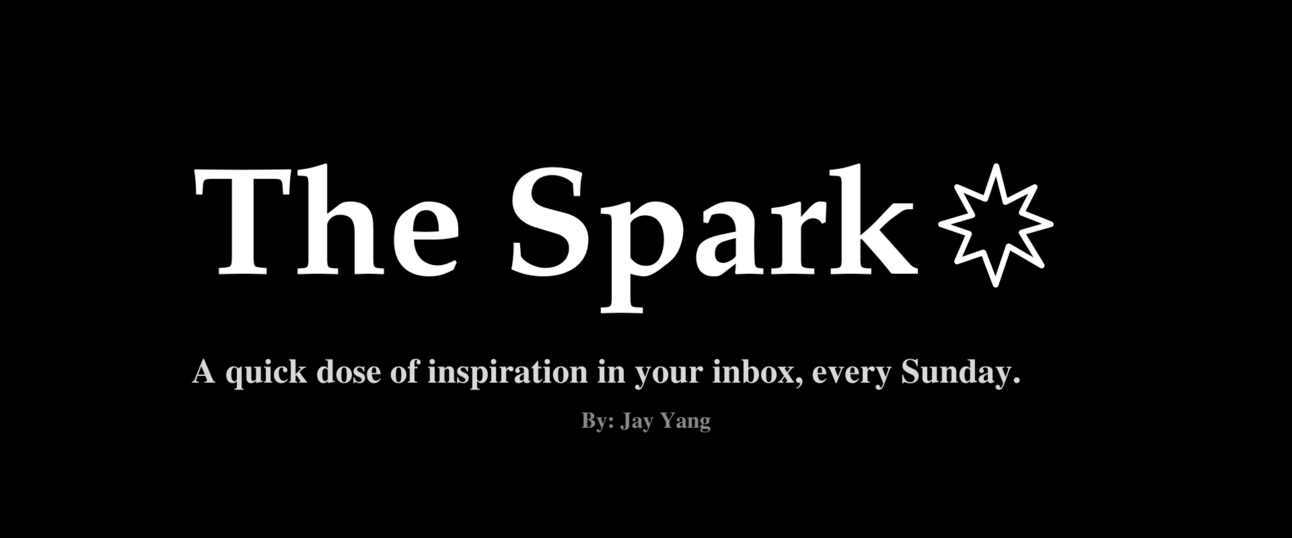
3 Thoughts
I.
You don't get to know someone through conversation. You get to know someone through how they handle conflict, adversity, and resistance. Anyone can be kind, considerate, and patient when things are going well. But what about when things go wrong? When an innocent mistake gets made. When someone disappoints you. When the stakes are suddenly raised. Who will you choose to be then? Character isn’t revealed when the things are calm. It’s revealed when all hell breaks loose.
II.
I cannot stress how important it is to set your own priorities for yourself. Because if you don't, the world will set them for you… and you will not like it.
III.
The quickest way to become more confident is to put yourself in situations where you’re forced to rise to the occasion. Sign up for that marathon with only 2 months to train. Commit to writing a book by the end of the year. Work out with friends who are way more fit than you are. Go first when everyone else is hesitating. Stress is a gift disguised as a curse.
2 Quotes
I.
Former CEO of AppSumo, Ayman Al-Abdullah on setting your own priorities:
“Your goal in life is to disappoint as many people as it takes to avoid disappointing yourself.”
II.
Spiritual teacher Anthony de Mello on curing loneliness:
“Loneliness is not cured by human company. Loneliness is cured by contact with reality.”
1 Game-Changing Idea: The Battles You Don’t Fight
“There is nothing so useless as doing efficiently that which should not be done at all.”
During World War II in the Pacific, American commanders faced a daunting challenge: thousands of heavily fortified Japanese-held islands stretched between them and Japan. Each stronghold bristled with bunkers, artillery, and soldiers ready to fight to the death. A conventional approach would mean bloody battles for each position, costing countless lives and years of warfare.
The Japanese strategy relied on this thinking. They had transformed islands like Rabaul and Truk into fortresses, expecting the Americans to exhaust themselves in frontal assaults. These bases held over 100,000 troops combined, dug into volcanic rock and coral, supplied with months of ammunition and food.
But Generals MacArthur and Nimitz saw a different path. They pioneered a revolutionary strategy called "leapfrogging" or "island hopping." Instead of attacking every Japanese stronghold, they would bypass the strongest positions entirely. They would seize only the islands needed for airfields and supply bases, then use these to cut off and isolate the bypassed garrisons.
The strategy worked brilliantly. American forces jumped from the Gilberts to the Marshalls, then to the Marianas, leaving fortress after fortress in their wake. Japanese commanders watched helplessly as American ships sailed past their positions. Their massive guns fell silent, pointing at empty seas. Supply ships stopped coming. The soldiers, trained for glorious battle, instead faced slow starvation.
By war's end, nearly 300,000 Japanese troops sat stranded on bypassed islands. Rabaul's 100,000-man garrison never fired a shot at the invasion force. Truk's "Gibraltar of the Pacific" became irrelevant. These forces were effectively defeated without a single American life lost fighting for those positions.
The lesson applies to more than just war. In our daily lives, we waste so much energy fighting battles that don't matter when we could have just made them irrelevant by ignoring them entirely.
Instead of researching the perfect productivity system, set a timer and start working. Instead of arguing with strangers on the internet, close the tab and let your results do the talking. Instead of cold emailing people to “pick their brain”, build in public and let the feedback come to you.
What are you optimizing for? And how can you achieve that with the most amount of certainty and least amount of risk?
The Americans understood this. They kept their eyes on Japan, not on every fortress along the way. I love how author Rosamund Stone Zander put it, "I am here today to cross the swamp, not to fight all the alligators."
Those 300,000 Japanese soldiers represented massive battles, thousands of casualties, months of delays. MacArthur and Nimitz looked at these "problems" and decided they weren't problems at all. By refusing to get distracted by every fortified position, by choosing their battles with ruthless clarity, the Americans turned an impossible campaign into an inevitable victory.
My favorite way to solve a problem is to decide it's not a problem.
Until next week,
Jay “Ignore The Alligators” Yang
Ps. Confusion.
Kind words for ‘You Can Just Do Things’

You can grab your copy here.
What'd you think of this week's newsletter?
Forwarded this email? Sign up here
Follow me on Twitter and LinkedIn

